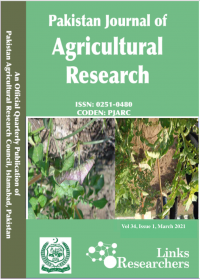Sheep Breeding and Agropastoralism in the Region of Ain Ben Khelile (Nâama-Western Algeria): Typology of Breeding Strategies
Sheep Breeding and Agropastoralism in the Region of Ain Ben Khelile (Nâama-Western Algeria): Typology of Breeding Strategies
Faradji Khalil1*, Slimani Noureddine2 and Senoussi Abdelhakim3
ABSTRACT
Sheep breeding and feeding in the steppe areas of Algeria is often linked to the use of pastures, but in light of climatic changes, drought, and deterioration of pastures, sheep breeders resorted to adopting pastoral agriculture to meet the needs of their livestock as a result of the deterioration of pastures, in addition to determining the patterns of livestock breeding in the Ain Ben Khelile region, Nâama Province (western Algeria). From a natural area characterised by a stepic environment in the region of Ain Ben Khelile wilaya of Nâama West of Algeria, A 02 year’s field survey and investigation (2021-2022), 50 farmers who agreed to cooperate in the research were randomly selected to engage in agriculture and animal husbandry. These farms are also located in a lower arid bioclimatic zone with cool winters. The methodological approach followed to carry out our study requires the use of appropriate observation or survey methods and the use of analysis means adapted to the situations encountered. In this context, the means used to carry out this work are based on documentary research, surveys and observations. Based on field investigations, three main categories of livestock breeders were distinguished the farmers surveyed have at least an education level thanks to the reforms carried out by the Algerian state in the field of rural development and that this profession did not remain the prerogative of illiterate people. The majority of educators surveyed are elderly as 52% of educators surveyed are between 36 and 50 years of age and 42% of educators surveyed have a primary education. It seems that the breeding of the Ouled Djellal and Rembi sheep breed is of great interest to livestock breeders because of its rusticity and ease of fattening.
To share on other social networks, click on any share button. What are these?







